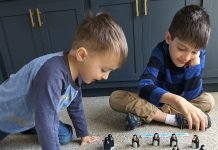
Prepare the child for the road, not the road for the child.
I was scrolling through Facebook the other day and these words on a friend’s page jumped out at me. Yes, I thought. Get your kid ready for the road.
I’ve been a school counselor for almost 15 years. That’s more than 2,500 school days, and on most of those days, I’ve gotten a peek into other people’s parenting. What I’ve seen over and over again are the ways that parents work to prepare the road so that it is flat and easy and mostly down-hill.
As a mom, I totally get it. I do. Watching your baby struggle—even when your baby drives himself to high school every day—is painful. My mama heart longs to help my kids avoid the rough spots along the way.
In about 150 days, my first baby will be unpacking his bags and boxes in a college dorm room. I won’t be there every day to cushion the rough spots. He’ll have to navigate the road on his own in ways he never has before.
I’ve learned a lot from other parents—some that falls into the “do” category and some that is definitely a “don’t”.
- My kid is going to make mistakes, because all people make mistakes. We learn a lot from messing up. When parents rush in to fix a problem, they are robbing their kids of that learning. In advocating for natural and logical consequences, Love & Logic author Jim Fay reminds parents that “affordable mistakes” can teach important lessons when the stakes are relatively low.
- My kid is always going to be faced with challenging situations because life is sometimes hard. People get sick and have car accidents and work for mean bosses. I can’t wave a magic wand and protect my kid from difficulty. I can encourage him to develop skills and habits that will help him face the difficulties.
- Sometimes moms see rough spots that aren’t really all that rough. Even though it’s hard, it’s important that our reactions match the situations. Watch your kid for cues about how much attention you should pay.
- Start teaching responsibility skills where your kids are. In schools, we call this scaffolding. Remember that as kids grow up, they are able to handle more and more on their own. My high school senior needs to know how to have uncomfortable conversations and make appointments and ask questions.
- There will always be unexpected experiences, and I want my kid to have some ideas of how to attack a new situation. My friend calls this “knowing what to do when you don’t know what to do.” One way to teach this is to talk about your thinking as you face something new.
Some days I wish I had that magic wand and could fix everything for my kid. But mostly, I know that my job is to get him ready for the road.
















